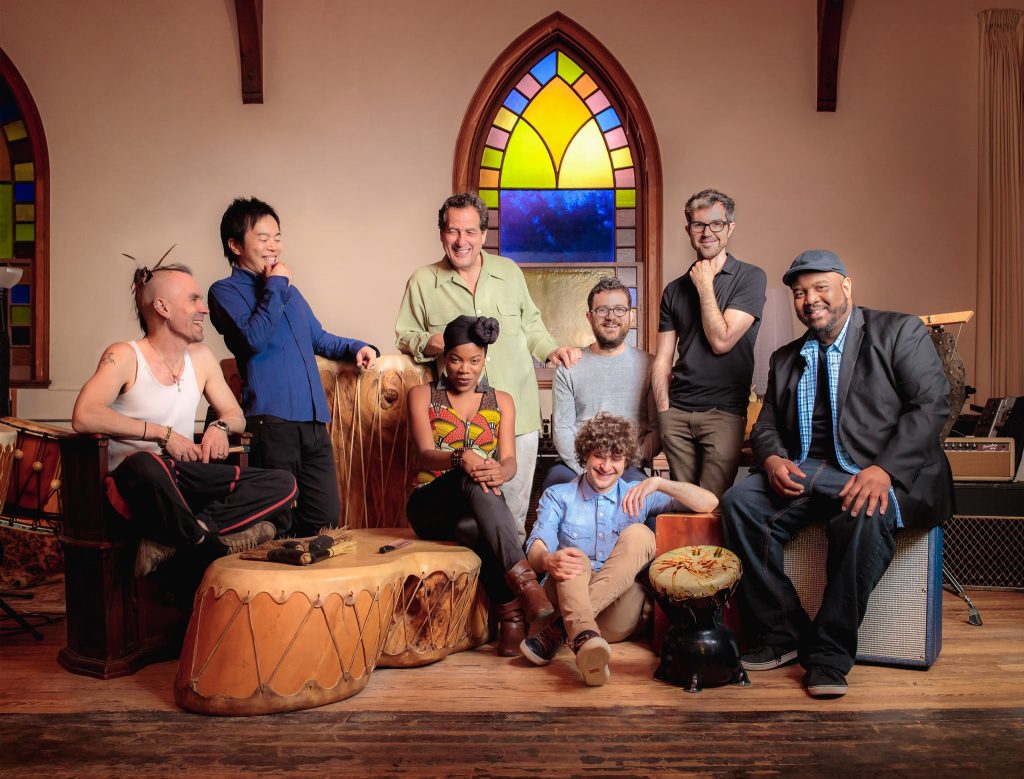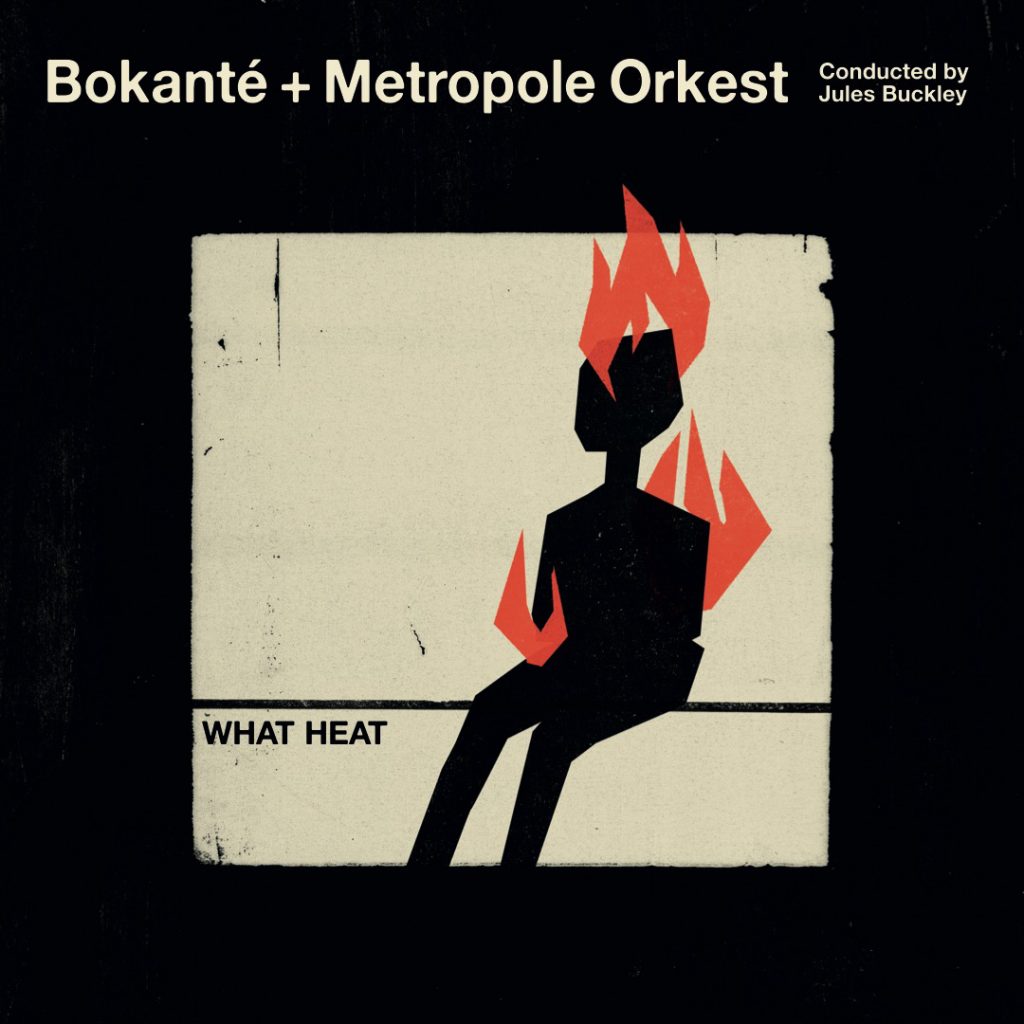BOKANTÉ ANNOUNCES NEW ALBUM

Photo by Francois Bisi
Bokanté’s second record What Heat, a collaboration with the Metropole Orkest (conducted by Jules Buckley) will be out on Peter Gabriel’s record label, Real World Records. It will be released internationally September 28th, and October 5th in the US and France. Discover on Friday the first single and music video for “All The Way Home”, shot on three continents.

Produced by Michael League. Engineered by Nic Hard at Dreamland Recording in West Hurley, New York, and Atlantic Sound Studios in Brooklyn, New York. Metropole Orkest recorded by Paul Pouwer and Nic Hard at Muziekcentrum van de Omroep, Studio 5, in Hilversum, the Netherlands on 6-8 January 2018. Electric bass engineered by Diko Shoturma at Atlantic Sound Studios in Brooklyn, New York. Acoustic bass engineered by Onür Ozçelik at Kalan Studios in Istanbul, Turkey. Mixed by Nic Hard and Michael League at Atlantic Sound Studios in Brooklyn, New York. Mix assisted by Denis Rens and Ken Helmlinger. Mastered by Dave McNair in Winston-Salem, North Carolina. Orchestra arranged and orchestrated by Michael League and Jules Buckley. “Réparasyons”, “Don’t Do It”, and “Chambre à Échos” arranged and orchestrated by Michael League and Stefan Behrisch. Orchestra conducted by Jules Buckley. Orchestra artistic production by Robert Soomer. Graphic design by Marc Bessant.
This heat: Bokanté and the Metropole Orkest, together. Two internationally acclaimed outfits made up of players at the top of their games. Music doesn’t get any hotter, or more accomplished than this.
Bokanté: the fresh new supergroup founded by musician and composer Michael League, he of Grammy-winning, Texan–bred, New York-based instrumental jazz collective, Snarky Puppy. A supergroup of players from five countries and four continents, different genders, races and generations working in harmony, celebrating individuality. A band whose members are united in the belief that music should be a voice for the voiceless, a force for change against a rising tide of exclusion and indifference in a world that is, well, reaching boiling point.
The Metropole Orkest: that multiple Grammy-winning hybrid ensemble, part jazz big band, part symphony orchestra, helmed by feted English conductor, composer and musician, Jules Buckley, and based in the Netherlands. A specialist in all styles, with a deep understanding of music, the Metropole is at ease playing jazz and pop, traditional music and film scores and has collaborated with legends from Ella Fitzgerald to Gregory Porter and of course, Snarky Puppy, along with a veritable constellation of rising stars.
Teamed with an outfit like Bokanté – which means ‘exchange’ in Guadeloupian Creole, the language of vocalist Malika Tirolien’s childhood island – the possibilities seemed endless.
“My first collaboration with the Metropole was with Snarky Puppy on Sylva, which won a Grammy in 2016 for Best Instrumental Album,” says League, who produced, arranged and co–wrote What Heat, with Buckley co–arranging, adding, changing, enhancing. “What Heat is an acoustic album, and every bit as adventurous. The orchestra is a huge part of the record; we explored sonic landscapes and had so much fun. It was a very creative opportunity.
“I couldn’t imagine doing any sort of orchestral record without Jules,” he continues. “He’s so in tune with the role the orchestra assumes in the context of a collaboration. He’s a true musician, a good friend and he lives in the world of modern music. He gets it.”
Working with Snarky Puppy’s now familiar funk, improv, and the jazz-based sound was one thing, states Buckley. Conveying the honesty of Bokanté’s music, with its disparate musical influences – music that also reflects the respective personal journeys of co-writers League and Tirolien – and ensuring that the two groups were in harmony, was another.
“Part of Michael’s brilliance as a composer is the way he captures the mosaic feeling of the group,” offers Buckley. “Each member of Bokanté is a virtuoso on their chosen instrument and a musical cog that eventually forms the overall sound. We honed the various elements and chipped away at anything we felt was unnecessary, and rewrote when we felt we’d missed the target, to make the record feel even more cohesive. There’s such a beautiful imagining of these compositions with an absolute non-compromise on the groove and feel.”
Listen to What Heat, to its earthy, almost rooted sound (think low brass, big strings, spiced up woodwinds), to the Creole and French–sung songs given life and magic by Malika Tirolien’s astounding voice, and it’s hard to believe that Bokanté was only founded just over a year ago, releasing a debut album, Strange Circles, that hinted at magnificent things to come. What Heat fulfills that promise, and then some.
“I wanted to put together a band that traces the blues from its roots in Africa and the Arab world throughout the diaspora and into a modern context,” says League, here playing everything from oud, Minimoog and fretless acoustic bass to bendir, riq and daf frame drum; he’s spent time studying Turkish percussion in Istanbul, and it shows. “A big part of the blues belongs to an acoustic idiom; I wanted this band to pursue how groove–based and soulful it can be.”
Joining League are Snarky guitarists Chris McQueen and Bob Lanzetti, and Miami–based pedal steel virtuoso, Roosevelt Collier. The group’s three main percussionists include Keita Ogawa – Nagasaki–raised, Rio–trained, a veteran of orchestras including the London Symphony and the group backing superstar cellist, Yo-Yo Ma. There is Jamey Haddad, the percussionist’s percussionist, ex–Berkeley music professor and longtime rhythm man for Sting and Paul Simon.
There is André Ferrari, a mohawked Swede whose innovative flourishes – on goat nails, grouse pipe, wooden Japanese bicycle bell – were a trademark of the Swedish folk outfit, Väsen, and whose self–penned ‘Shapons Vindaloo’ is the first track Snarky Puppy ever recorded. There is special guest Weedie Braimah, a Ghanaian djembe master whose skills stretch back for generations.
And then, of course, there is Malika Tirolien, the Montreal–based Guadeloupian vocalist with the huge honeyed voice. “Malika’s voice covers several frequency bands,” says Buckley, “so the challenge on What Heat was to make sure there was enough space for all the different elements – winds, strings, brass, percussion, guitars, drums, more drums – to thrive during the recording. I think Mike’s producing achieved that task brilliantly.”
Trained in classical piano and jazz, Tirolien was fronting a hip-hop–leaning group called Groundfood that supported Snarky Puppy in Quebec and duly blew League and Co away. “The whole band was like, ’Who the **** is that?’” grins League. “She was one of our first guests on the [2014] Snarky Puppy record Family Dinner Volume 1; she sang in Creole and everybody loved how it sounded. When I started writing music for Bokanté I was thinking of singers and she was the only one I thought would work. Plus we’d known each other for five years by then and had become like family.”
The French-based Creole language has a percussive flow; Tirolien’s dialect is particular to Guadeloupe and not dissimilar to the neighboring Caribbean island of Martinique: “It’s a very funky language to listen to. Of course, the whole island speaks French, their colonial language, but Creole is really a Guadeloupe thing so we thought it was more genuine for her to be expressing herself in this language– she was happy about that.”
Tirolien has the gift of conveying real emotion, even if we don’t understand what it is she’s saying.
“The important thing for us is that the groove feels good and the melodies resonate within you,” says League. “Because you don’t get to that second step – what are the lyrics about, what is the statement? – until you’ve actually been enjoying the sound. Then, seeing us as a group of people from five countries and four continents, each one with their own story and upbringing… all of that co-existing to create a sound that is harmonious and groovy and joyful is, in itself, a message.”
A smile. “Then they read the lyrics and go, ‘Oh. She’s talking about some heavy stuff.’”
Tirolien and League had started Bokanté by co-writing remotely, their creative exchanges fleshing out the ideas on the latter’s iPhone: “I would send Malika the music and a lyrical concept that was socially conscious, to do with individual and social struggles or more specifically about strife and success, racism and apathy and the refugee crisis; hopes for peace and unity. She would write the lyrics and melody, demo the song and send it back.”
This time around, for What Heat, the two came together to write, carving out space for a creative retreat in Spain. “There’s no replacement for spending time together onstage and offstage. That made a big difference to us, actually being there together and looking at that first record and building upon what works. I wrote most of these songs on oud, which I hear as a blues instrument. It has no frets so is it comes across like a slide guitar, in a way.
“Malika is an observer of life,” he says. “She has such a talent for writing these lyrics with images that tell stories, that take interesting perspectives without beating you over the head with their message.”
But the message delivered by Bokanté and the Metropole Orkest, by these two, determinedly woke and musically gifted outfits, is laced throughout What Heat – and it is urgent. Injustice is raging all around. Look. Notice. Wake up.
Dance, too; What Heat makes you want to dance.
“If it makes you want to change something,” says League, “then that’s a bonus.”
Listen here

